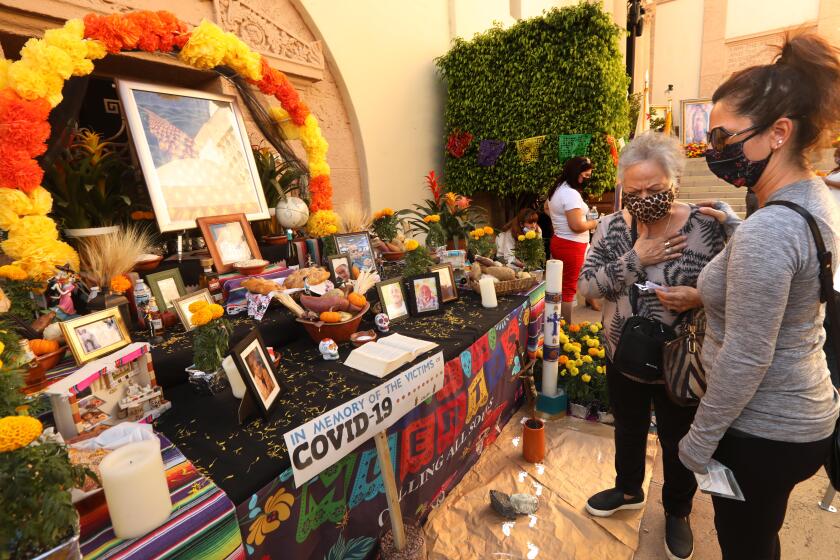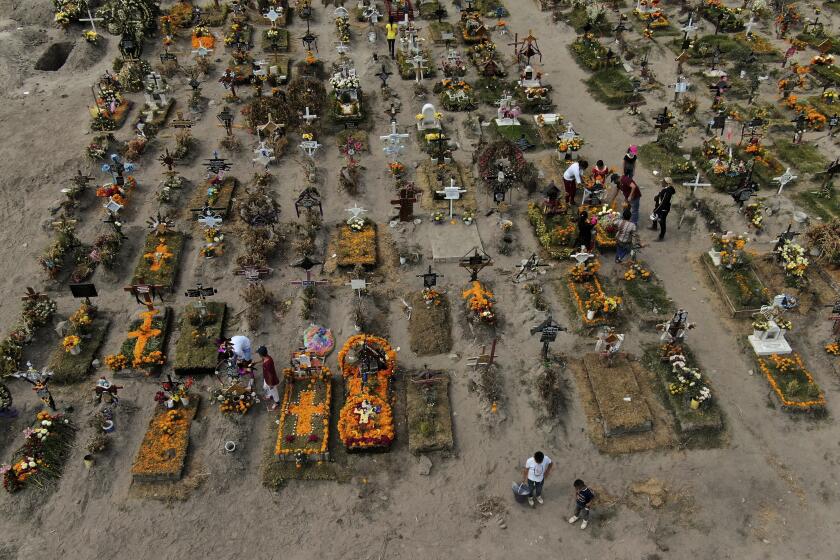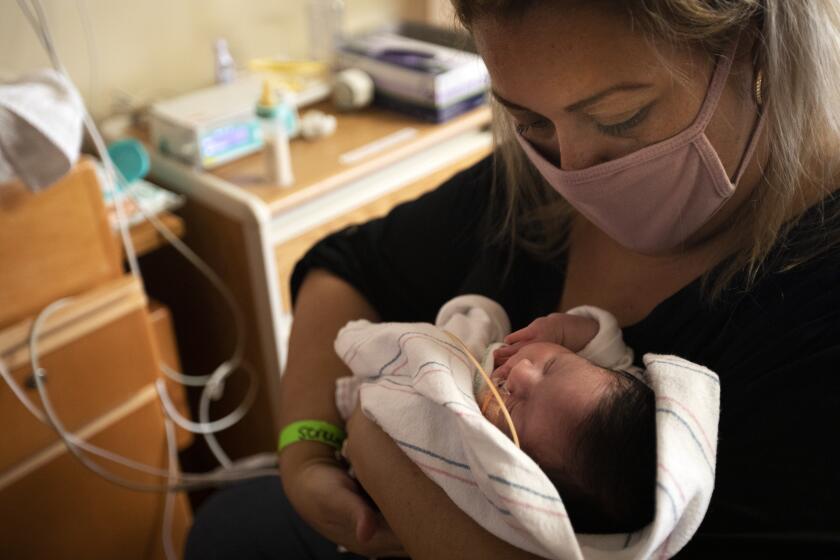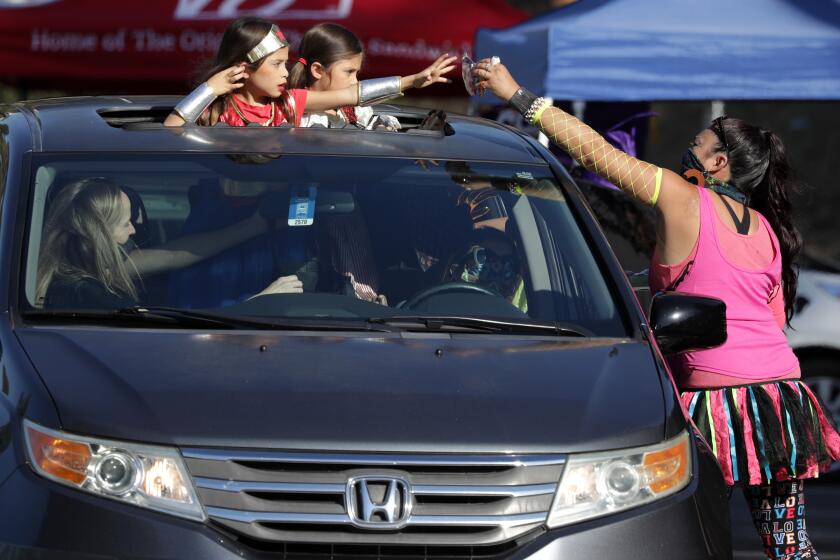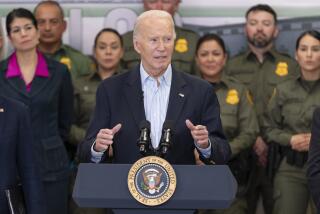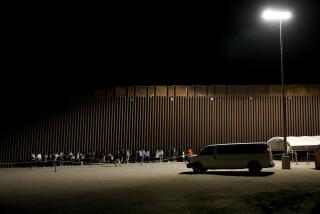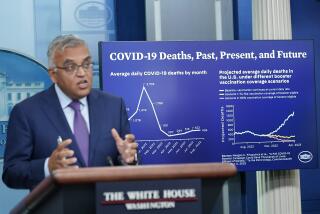The coronavirus didn’t respect borders. Now El Paso and Juarez face a mounting crisis
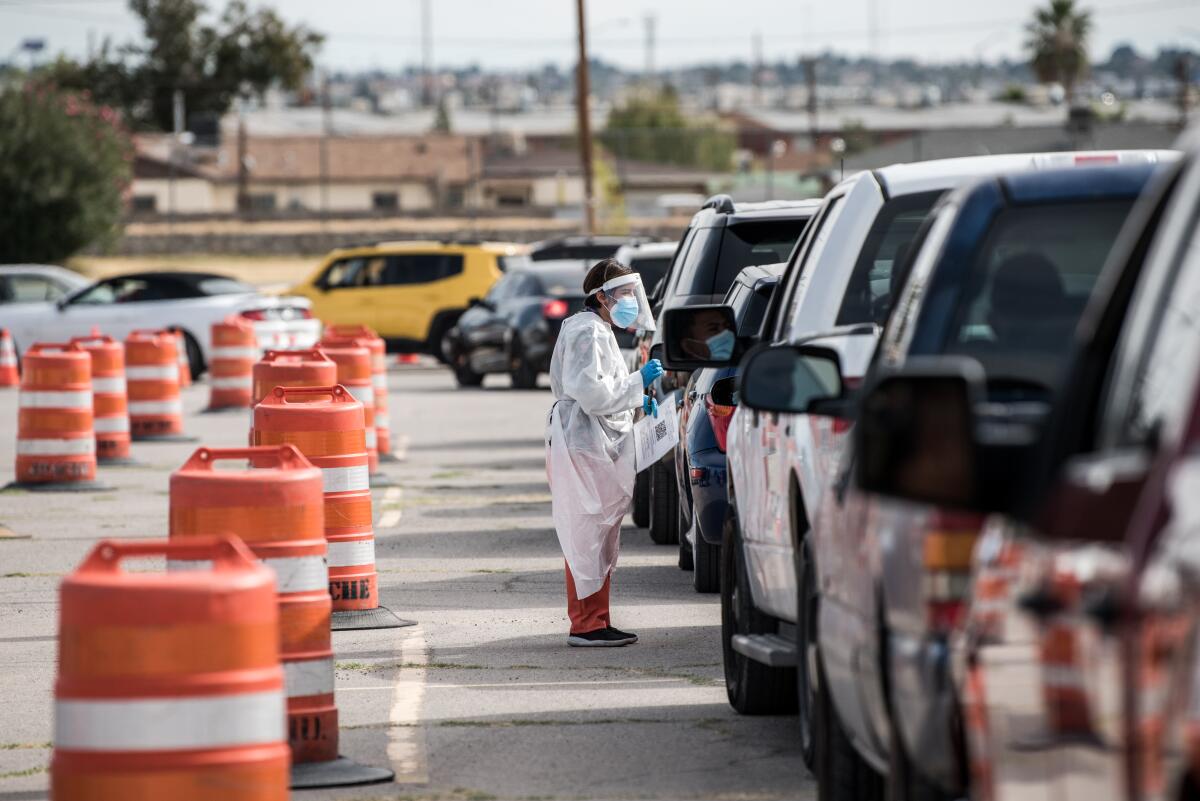
Like many Americans, Jazmín Cabrera and her wife, Miriam Cereceres, spent Tuesday night watching election results trickle in.
But the El Paso couple had much more than politics on their minds.
Cereceres, six months pregnant with their first child, had fallen ill a week earlier, hammered with a fever and severe cough. Soon Cabrera was sick too.
Their coronavirus tests came back positive — two more cases in what has become one of the biggest such outbreaks in the country. Now their focus was simple: Do whatever it takes to stay out of El Paso’s hospitals, which had become so crowded that some patients were being airlifted to other cities.
“I’m really worried about her and the baby,” said Cabrera. “We start to feel better, but then we feel so bad again.”
While the rest of the country was preoccupied with the presidential election, with vote-counting predicted to stretch until the end of the week, there remained large pockets of America consumed by the virus. On Wednesday, the U.S. reported more than 100,000 new coronavirus cases in a day for the first time — a stark reminder to whoever takes the White House that the pandemic is getting worse.
California has escaped the glaring spikes seen in many parts of the U.S., but health officials warn residents and businesses to keep up the vigilance.
The virus was a defining theme in the campaigns of President Trump and Joe Biden, highlighting America’s failed response and the complexities of a pathogen not bound by borders. This high desert city a stone’s throw from Mexico speaks to the challenges a new administration will face in reining in the disease while protecting cross-border trade and easing economic hardship.
Few places have been as overwhelmed by the virus as El Paso. The city and surrounding county — with a population of 840,000 — reported 3,100 new cases Wednesday, soaring past the previous daily record by more than 1,000.
The number of patients — 1,041 hospitalized, with 311 in intensive care units — also broke records.
“Our hospitals are near breaking point,” warned Hector Ocaranza, El Paso’s city and county health authority, who urged “everyone to do their part to stop this virus.”
The recent dramatic surge in cases here is the worst crisis to hit El Paso since a white supremacist entered a Walmart with a semiautomatic rifle last year and killed 23 people.
Like that tragedy, which claimed victims from the United States and Mexico, the coronavirus outbreak has been binational in nature, with daily deaths and infection rates in the Mexican city of Juárez also shattering records.
The pandemic has quieted one of the country’s signature holidays — Día de los Muertos, or Day of the Dead, when Mexicans honor deceased loved ones in often-boisterous fashion.
This border has always been somewhat intangible — an arbitrary line crossed daily by tens of thousands of people for work, school and family. The landscape — brown, dry and dotted with mountain ranges — looks the same on both sides.
An effort by both countries to limit nonessential trips has reduced border crossings by less than a third. The pandemic has thrived amid the comings and goings, and cemeteries throughout the region have seen a steady stream of mourners.
After Cereceres tested positive, but before she began experiencing symptoms, Cabrera traveled to Juárez to pick up medication from her wife’s doctor. She unknowingly infected a cousin on that trip.
Another relative in Juárez — from a different branch of her family — spent last week tethered to a ventilator in a Mexican hospital alongside her daughter, who was also sick. On Tuesday, the mother died.
El Paso and Juárez have instituted curfews in recent days, although the one in Mexico is more stringent, with residents confined to their homes after 7 p.m. In both cities, supermarkets have been inundated with people buying food in case of broader lockdowns.
Data from tech companies including Facebook show that movement in El Paso has slowed 20% to 40% since a 10 p.m. curfew was imposed, said Dr. Ogechika Alozie, an infectious disease expert who is a member of the Texas Medical Assn.’s COVID-19 task force.
“This is not the year to have a turkey dinner with 20 people,” he said. “This is not the year to have the whole family unwrapping gifts under the tree.”
Very little is known about the impact of COVID-19 on women and the babies they carry.
Only a few months ago, El Paso was celebrating its success in fighting the virus, including a positivity rate as low as 4.5% early in September.
But not everyone agreed on how best to contain the virus, with the city’s Republican mayor publicly bickering with a county judge who ordered that nonessential businesses should close.
Now nearly a quarter of all tests come back positive. Officials have erected a makeshift hospital inside the city convention center and have brought in two additional mobile morgues. Downtown is eerily empty, its collection of hip new hotels in restored Art Deco buildings devoid of guests except for emergency hospital staff sent from other parts of the country.
But certain cultural rhythms — from backyard barbecues to Dallas Cowboys watch parties — have not stopped, which has led to the increase in infections. Richard Pineda, the director of the Sam Donaldson Center for Communication Studies at the University of Texas at El Paso, said that he was at first dubious of claims from epidemiologists that the region’s traditions were partly to blame.
No longer.
“You’ve got a tight familial structure that’s tied to Mexican American culture,” he said. Multi-generational family gatherings are a key part of that.
The mayor of Juárez recently wrote a letter to Mexico’s foreign secretary asking him to stop Americans from entering the country, warning that “indiscriminate crossings are contributing very actively to the spread of the virus.”
The mayor, Armando Cabada, left a hospital in a wheelchair Wednesday, two weeks after he was hospitalized with COVID-19. An outbreak at Juárez City Hall claimed the life of a member of his administration, tourism director Alejandro Siller, on Oct. 23.
Unease echoes on both sides of the border.
“I grew up in El Paso, and I never felt afraid,” Pineda said. “The Walmart shooting was the first time I did. I hadn’t felt that kind of fear again until last week.”
Health officials say it’s unlikely Los Angeles County will see any movement on the state’s reopening tiers in the coming weeks.
Those who can are staying home, including Pineda, who survived a heart attack and is especially at risk if he gets sick. But many people can’t afford that.
“You gotta get paid and go to work,” said Javier Corral, a 34-year-old electrician who on a recent morning pulled down his mask to eat a quesadilla on a downtown city bench.
Corral was on break from a nearby construction site where several workers recently tested positive for the virus.
“They keep getting sick one after the other,” he said. “Everybody’s going to end up getting sick there. We share the same tools.”
He hates going to work, but there is little choice.
“The bills don’t stop coming,” he said.
Even for an expectant mother vigilant about wearing face coverings, the virus was unavoidable.
Cereceres caught the virus at the veterinarian clinic where she works. Both she and Cabrera, who services vehicles at a car dealership, have jobs “where we have to be near people a lot.”
Cabrera thinks the city should lock down completely for two weeks to slow the spread of the virus.
The couple were happy to hear on Wednesday that their candidate in the presidential election, Joe Biden, seemed on track to win. Cabrera said she hoped he could get the pandemic under control.
But for now, her focus was on the health of her wife and the child she was carrying. “Just stay healthy,” she said. “That’s all we have to do.”
Special correspondent Gabriela Minjares in Ciudad Juárez contributed to this report.
More to Read
Start your day right
Sign up for Essential California for news, features and recommendations from the L.A. Times and beyond in your inbox six days a week.
You may occasionally receive promotional content from the Los Angeles Times.
